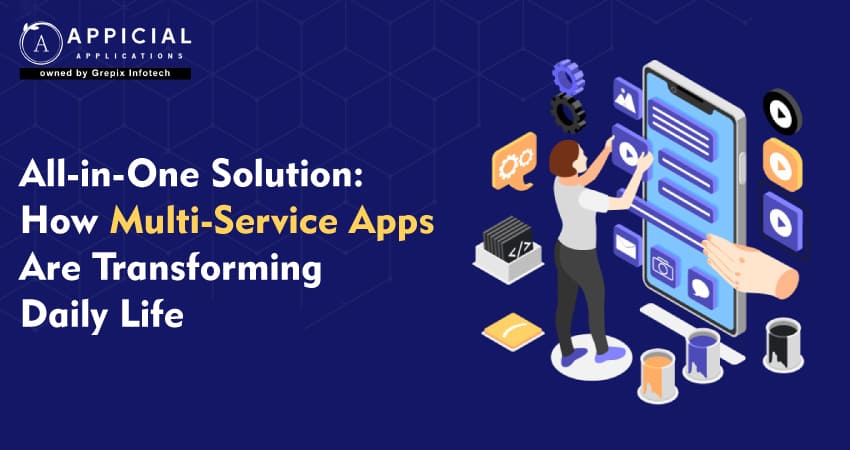
All-in-One Solution: How Multi-Service Apps Are Transforming Daily Life
In today's fast-paced world, convenience is not just a luxury. it's a necessity. As our daily schedules become increasingly packed, the demand for streamlined solutions that simplify our lives has soared. Enter multi-service apps, a revolutionary development in technology that is transforming how we manage our day-to-day activities. These all-in-one platforms are not just changing the game; they're redesigning the entire playbook.
Multi-service apps consolidate various services ranging from transportation and food delivery to home services and entertainment into a single, easy-to-use interface. This integration allows users to accomplish multiple tasks from their smartphones without the need to switch between different apps. In this blog post, we'll explore how these versatile applications are making everyday tasks more manageable and freeing up valuable time for users around the globe, thereby enhancing overall life quality. Join us as we delve into the world of multi-service apps and discover how they are becoming the ultimate tool for modern living.
In the digital era, multi-service apps are revolutionizing daily life by combining various services like transportation, food delivery, and home maintenance into a single platform. These apps offer unprecedented convenience and efficiency, saving time and simplifying user decision-making. They enhance economic and operational efficiency for businesses by maximizing resource utilization and improving customer retention. Despite challenges like maintaining service quality and navigating complex regulations, the future of multi-service apps is promising, with potential expansions into new sectors like healthcare. As technology evolves, these platforms are set to offer more personalized and secure services, fundamentally transforming service delivery and enhancing user engagement.
The Rise of Multi-Service Apps
The rise of multi-service apps marks a transformative trend in the tech landscape, driven by the demand for more integrated and convenient solutions in everyday life. These platforms, which consolidate various services like ride-sharing, food delivery, and on-demand home repairs into a single application, cater to the modern consumer's desire for efficiency and immediacy. As urban populations grow and lifestyles become increasingly fast-paced, multi-service apps address the need for quick, easy access to a range of services, often with cost benefits and time savings. This shift not only enhances user experience by reducing the clutter of multiple apps but also offers businesses new avenues for growth through cross-promotion of services and deeper customer engagement.
Also Read: Empowering Education: Essential Steps for Developing an E-Learning App
Convenience at Your Fingertips
The allure of multi-service apps lies in the sheer convenience they offer, putting a wide array of services at your fingertips. With just a few taps on your smartphone, you can order food, book a ride, schedule a cleaning, or even handle unexpected tasks like emergency plumbing repairs. This level of accessibility is particularly appealing in our fast-paced world, where time is often at a premium. By streamlining the process of accessing various services, these apps not only save users time but also simplify day-to-day decision-making. Whether it’s planning a last-minute dinner, commuting across town, or managing household chores, multi-service apps provide a one-stop solution that meets a broad range of needs, making daily life not just manageable but also more enjoyable.
Economic and Operational Efficiency
Multi-service apps contribute significantly to economic and operational efficiency, both for consumers and businesses. For consumers, these apps provide the convenience of accessing multiple services through a single platform, often at lower costs due to bundled offers and discounts. This consolidation reduces the time and effort spent in managing separate accounts and transactions, leading to better budget management and fewer financial outlays for individual services.
On the business side, multi-service platforms allow companies to streamline their operations and reduce overhead costs. By offering multiple services, businesses can maximize resource utilization—whether it's leveraging the same delivery fleet for food and parcel delivery or using data analytics across different services to optimize supply and demand forecasting. Additionally, these platforms enhance customer retention by keeping users engaged with a diverse range of offerings, thus increasing the lifetime value of each customer.
Enhanced User Engagement
Multi-service apps significantly enhance user engagement by offering a diverse array of services that cater to various aspects of daily life, all within a single platform. This integrated approach keeps users active within the app environment for longer periods, as they can transition seamlessly from booking a ride, to ordering a meal, to scheduling a home service without the need to switch interfaces. The convenience of having multiple needs met through one application increases user satisfaction and loyalty, as the hassle of managing multiple accounts and apps is eliminated.
Furthermore, these platforms often utilize sophisticated algorithms to personalize user experiences, recommending services based on past behavior, preferences, and even the time of day. This level of personalization not only makes the user experience more engaging but also more relevant, which can significantly boost the frequency of use. By continuously adapting to the individual needs and preferences of their users, multi-service apps are able to create a more dynamic and interactive environment that fosters long-term engagement.
Challenges and Considerations
As multi-service apps continue to grow in popularity, they face a myriad of challenges and considerations that can impact their operational effectiveness and long-term viability. One of the primary challenges is managing the complexity of offering multiple, diverse services under a single platform, which can strain resources and dilute service quality if not managed properly. Additionally, these apps must navigate a complex web of regulatory requirements, as they often operate across different industries, each with its own legal standards and customer expectations. Data privacy and security are also paramount, as the consolidation of services into one app involves handling significant amounts of sensitive user data, making it a prime target for breaches. Moreover, maintaining customer engagement in an increasingly saturated market demands innovative strategies to deliver value and differentiate from competitors.
The Future of Multi-Service Apps
The future of multi-service apps looks promising, with continuous advancements in technology paving the way for more sophisticated and user-centric platforms. As artificial intelligence and machine learning become more integrated, these apps are likely to become even more intuitive, offering personalized experiences that predict user needs and streamline service delivery. Furthermore, the integration of emerging technologies such as blockchain could enhance security and transparency, particularly in transactions and user data management.
We also anticipate a broader expansion into less traditional services, including healthcare and education, creating a more comprehensive ecosystem that caters to a wider array of personal and professional needs. Additionally, as consumers increasingly value sustainability, multi-service apps might focus more on eco-friendly and socially responsible options, enhancing their appeal to a more conscientious audience. Overall, the evolution of multi-service apps will continue to shape how convenience and efficiency are delivered, fundamentally altering the landscape of service provision in the digital age.
Conclusion
In conclusion, multi-service apps are redefining the paradigms of convenience and efficiency in our digital age, demonstrating the vast potential of integrated service delivery. As an on-demand app development company, we are at the forefront of this transformative movement, crafting solutions that not only meet the diverse needs of modern consumers but also enhance their daily lives through technology. The journey of multi-service apps is just beginning, and as the landscape evolves, so will the capabilities of these platforms. We are committed to innovating and expanding our offerings, ensuring that the future of service delivery is not only convenient but also adaptive, secure, and aligned with the ever-changing demands of our users. The transformation brought about by multi-service apps is vast, and we are excited to be a part of this dynamic shift, helping to shape a more interconnected and efficient world.
Looking out to start your own venture like Bolt? Try out our HireMe Taxi Bolt Clone, the easiest way to kick-start your taxi business.





